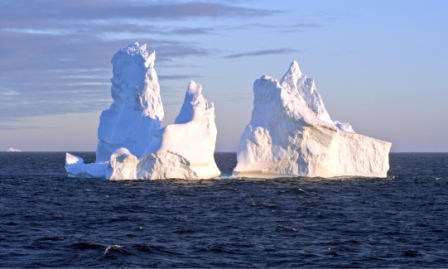Icebergs as a Fresh Water Source
by Nancy Hearn, CNC
Note: As an Amazon Associate I earn from qualifying purchases.
The idea of using icebergs as a fresh water source is not new. Nearly 70 percent of the Earth’s fresh water is locked up in polar ice caps.
Since world population is expected to double to about 12 billion in the next 50 years, it makes sense to start planning to use other fresh water resources.
A good-sized iceberg contains about 10 to 30 billion gallons of fresh water. And yes, it is fresh water.
Even though icebergs float in the salt water of the ocean, the ice is compressed snow and does not contain salt.
Melting the ice and then filtering the water of possible contaminants would produce clean drinking water for many people.
Thus, the concept of towing huge icebergs, mainly from the Antarctic region, has been considered for many years.
Towing Icebergs Closer to Land
The main way considered on how to use icebergs as a fresh water source is to:
- Locate a large stable iceberg
- Somehow wrap and insulate the iceberg so that it doesn’t melt when moved
- Attach the iceberg to a hefty tug boat
- Tow the iceberg to whatever part of the world needs fresh water the most, which is currently South Africa and Saudia Arabia.
Even though experts have determined it is technologically possible to tow icebergs, there are definite challenges to consider.
The first challenge is prevent the iceberg from melting along the way. The movement of water over the iceberg would cause it to melt fairly quickly.
Thus, the iceberg would have to be wrapped and insulated. This would require a very strong fabric to withstand the elements and a huge amount of it.
In addition, it would certainly be hard to wrap the iceberg below the water since a big iceberg is hundreds of feet deep.
The second challenge is getting the iceberg anywhere near land, again because of the underwater size of the iceberg.
The third major challenge has to do with the high cost that it would take to tow icebergs as close as possible to the land where it is needed and then to figure out how to harvest the water with minimal loss.
According to Research Gate the overall idea for towing icebergs as a fresh water source is feasible and should be explored further.
Mining Icebergs
Another method that has been considered, which makes a lot more sense to me, is to mine icebergs in the Arctic and fill supertankers with ice shavings.
At this time, modern tankers could hold about 100 million gallons of water.
Even though that is only a fraction of the amount of water contained in a large iceberg (which is about 20 billion gallons of water), it is still a lot of fresh water.
It seems to me that it would be much less expensive and easier to transport fresh water to many different parts of the world as needed.
References
Research Gate: Icebergs as a Fresh Water Source
Science: How Stuff Works; What If People Wanted to Use Icebergs as a source of Fresh Water?
Return from Icebergs as a Fresh Water Source to World Water Scarcity
If you would like to reproduce or republish this article or any other article on this site, feel free to do so but please include a reference or link to the article at WaterBenefitsHealth.com.
Sign Up for Our Monthly
Newsletter
Visitor Comments
"This was the best and most straight forward info on the net yet. I asked a question and got an answer that made sense. Thank you so much!" - Linderlinder
FINALLY!!! I have been wondering about this for years with no 'solid' answer. This is exactly what I've been wanting to know! Thank you for this share..." by Andy
"Thank you for the information, Nancy. I appreciate it. Your article and findings are very helpful, referring to dehydration." - Carolyn
"Lemon water is one drink both my wife and I can't drink. It upsets our stomachs. We are in our sixties and in very good health—well, better health now that we drink about 2 liters plus of water each day. It has made so much difference to our digestive systems and recovery every day. Thank you for your website and effort." - Rod



